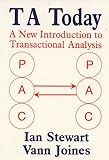 How do you manage your time? Are you any good at it? Well, according to TA theory there are six main ways in which we keep ourselves OK when dealing with time. Each method has its advantages and disadvantages. Many of them we do simply to be recognised as an OK human being. Why am I telling you all of this and what does it have to do with the fact that you feel angry/sad/scared/happy about things that are going on in your life at the moment? Well one of the ways in which we manage time is by playing games. Game theory is so interesting and significant in our lives that I’m going to write a post on it all by itself. This post is there to give you the background and explain where it fits in with the rest of the theory.
How do you manage your time? Are you any good at it? Well, according to TA theory there are six main ways in which we keep ourselves OK when dealing with time. Each method has its advantages and disadvantages. Many of them we do simply to be recognised as an OK human being. Why am I telling you all of this and what does it have to do with the fact that you feel angry/sad/scared/happy about things that are going on in your life at the moment? Well one of the ways in which we manage time is by playing games. Game theory is so interesting and significant in our lives that I’m going to write a post on it all by itself. This post is there to give you the background and explain where it fits in with the rest of the theory.
Time structuring is an important subject in TA and one that I find fascinating and poignant. I’m rubbish at dealing with boredom. I also like to be stimulated by what I’m doing and so when forced to go to meetings that are dull or training courses when I already know the material I get very fidgety. Berne explained this by saying that human beings like to avoid the “pain of boredom”. We have to structure our time to avoid it and he called this “structure hunger”. He went on to say that what we are really after is stimulation in the form of strokes so we have to set up situations so we can get them. A stroke is seen in TA terms as “a unit of recognition”. If you want to read a more detailed blog post about them read Facebook, Twitter and the Stroke Bonanza .
The six ways in which we manage our time are (from lowest emotional risk to the highest)…….
Withdrawal
We all withdraw at times in our lives and it can be a great way to process our thoughts and work things out for ourselves. When we withdraw we are getting no strokes from anyone else. If we withdraw for too long or too often we can become stroke deprived and this might lead to loneliness or depression. Withdrawal puts no demands on us to be intimate and so there is no emotional risk involved.
Rituals
A ritual is carried out when we exchange strokes in a predictable way. When we walk passed our colleague at work and say “Hi, how are you?” we are engaging in a ritual. Quite often we are not actually enquiring as to how the other person is and they know this, so the exchange may go:
Bob: “Hi, how are you?”
Mary: “Good thanks, and you?”
Bob: “I’m great thanks.”
The exchange will most likely go like this whilst both parties carry on walking and even though Bob is really feeling very worried about the report he has to get in by 5pm that day and Mary has a banging headache that she can’t shake. What they are really doing is acknowledging each other’s existence and exchanging low grade strokes.
A great way to illustrate this is to remember how you felt when you said “hi” to someone and received nothing back. Most of us feel very put out! We ask ourselves “why didn’t she say hello?” and usually spend a few minutes mulling it over. We have given a stroke and the ritual is to get one back. When people don’t follow these unspoken rules it evokes feelings in us.
Rituals are a great way to get maintenance strokes but don’t really give us much more than that. Human beings need higher quality strokes in order to feel OK, so if these are the only strokes someone is getting it is likely that they are going to feel lonely and fed up.
Pastimes
When you go to a party and don’t really know the other people there what do you talk about? There are certain subjects that feel safe and that are easy to engage others with. Examples include politics, sport, music, fashion, or if you’re English, our favourite, the weather! When we pastime we are merely exchanging strokes with others. We are not trying to solve anything. There is a semi-rigid set of unspoken rules in place and if they get broken (for example, one party becoming intimate or thinking about how a problem can be solved) the pastiming stops. Pastiming is a great way to get to know others and it helps us decide who we want to get closer to and who we want to avoid.
Activities
We are carrying out an activity when we are directing our energy towards external sources. I have managed to alleviate my boredom right now by typing this blog post. My hope is that you are avoiding boredom by reading it (though I’ sure some would disagree!). Hobbies, jobs, cleaning the house – these are all activities and they can be a great source of strokes. When we get praise for the good work we have done or that shiny big trophy for coming first in the spaghetti eating competition it feels great! So does being paid at the end of the month. Negative strokes are also available in the form of tellings off by the boss or criticism from our work colleges. Remember the rules of stroking though. Negative strokes are better than none.
Rackets and Games
Berne defines a game as “an ongoing series of complementary transactions which lead to a well-defined predictable outcome”. Games are so important to TA theory that they warrant a post all of their own (click here to read). It’s important to note that when we play games with others (and I ain’t talking tiddly winks) we can produce large quantities of intense strokes. These strokes often start off positive and then become negative as the game progresses and we get our payoff.
Intimacy
Here it is – what we are all after. The most risky and the most rewarding of all the ways of structuring time. Being intimate with another requires that we are open and honest and we exchange strokes with another without any hidden agenda and completely in the here and now. There is no other form of time structuring going on and we are not looking to exploit the other individual or set something up for later. Intimacy can be positive or negative and results in true feelings in the free Child ego state. Sometimes it does not involve words at all and it does not just occur with those that you love. You can be intimate with anyone but it does feel a great deal safer with those that you have built a strong relationship with. Someone who believes themselves and others to be OK is much more likely to be intimate than a person who believes themselves or others to be not OK. Because it feels risky, many people are scared of intimacy and seek their strokes through one of the above methods instead.
There they are then, the six ways in which we structure our time. Which ones do you do most? Do you have any great examples of any of them? Let me know by commenting below. I also provide therapy in Manchester, if you want to work with me just click on my contacts page and get in touch.
 If we go back to the scenario we were facing in the
If we go back to the scenario we were facing in the  This all may sound like a long and drawn out process but let’s face it, we think quickly. All of this can rush through our minds in a few seconds. Another thing to understand is that we have lots of urges during a day and many of them are no problem at all. Have the urge to eat a Jammy Dodger? Go eat a Jammy Dodger, it’s not really going to impact on our lives (unless we are allergic to jam!) Have an urge to eat a packet of Jammy Dodgers? Now, that might be a problem if our values are to stay healthy and maintain a sensible weight and diet so get your metaphorical wet suit on ready for action!
This all may sound like a long and drawn out process but let’s face it, we think quickly. All of this can rush through our minds in a few seconds. Another thing to understand is that we have lots of urges during a day and many of them are no problem at all. Have the urge to eat a Jammy Dodger? Go eat a Jammy Dodger, it’s not really going to impact on our lives (unless we are allergic to jam!) Have an urge to eat a packet of Jammy Dodgers? Now, that might be a problem if our values are to stay healthy and maintain a sensible weight and diet so get your metaphorical wet suit on ready for action!
